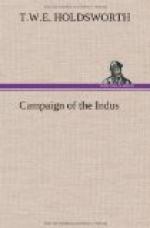At one o’clock we turned out; I took a cup of tea and a couple of ginger biscuits, and joined my company: in a quarter of an hour we were on our march to the pillar, where we were to be formed. Here we found Col. Sale and the Engineer officers, &c. Col. Sale called out the officers, and told them the plan of the attack, which was to be the same as mentioned before, except that the 13th Light Infantry were to line the ditch outside the town, and fire on the ramparts, while we advanced. The storming party, Queen’s and Bengal European regiments, were, after entering the gate, to move along a street to the left, clearing the houses, &c., and on arriving at the end to mount the ramparts, and to return by them. Our object in doing this was to drive as many men as possible into the citadel, and having obtained this object, a signal was to be given, and the artillery were to fire shells into the citadel, which, particularly as their powder magazine was there, it was expected would soon make them cut and run. The 17th and 13th regiments being nearest, were then to rush up and take possession of the citadel, and the Native regiments, being in reserve, were to assist them. Col. Sale then said a few words of encouragement, and concluded by hoping “we should all have luck”—on the whole a very neat and appropriate speech. We then piled arms, and officers fell out. I never saw fellows more merry than most of us were while we were waiting there; in fact, if we had been going to the most delightful place in the world, we could not have appeared in better spirits; and this put me strongly in mind of a scene I had read in a book called “The Subaltern,” where the feelings of the officers, waiting for an attack, are described as being just the same. At length, “bang” went a gun from our batteries. Col. Sale said, “Ah, there goes the signal; we had better be starting:” just as if one was to get ready to take a ride to Brixham or elsewhere. Well; we fell in, and in about a quarter of an hour off we went. The enemy returned the fire from our batteries in good style, and there was a regular row. They pointed their “Long Tom,” a fifty-two pounder, towards us, and sent the shot over our heads and a little to our left. The ball made a terrific row rushing over us. Whilst we were marching down to the attack the fire on both




